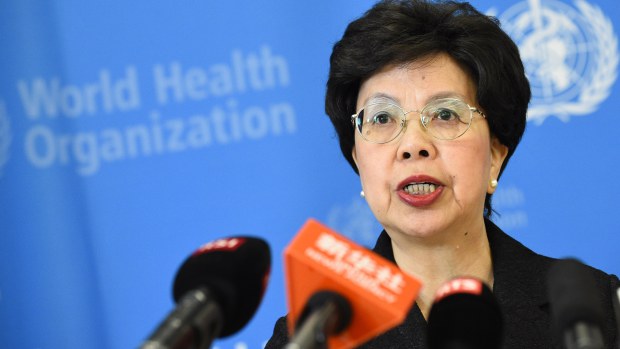
WHO Director-General Dr. Margaret Chan, pictured above, criticized the drug industry on Monday for putting profits ahead of public health by ignoring the Ebola virus until it affected Western countries like the U.S.
The head of the World Health Organization (WHO) on Monday castigated the pharmaceutical industry for failing to develop a vaccine for Ebola over the some 40 years that the virus has threatened West Africa.
Speaking in Cotonou, Benin, Dr. Margaret Chan, the director general of the WHO, wondered rhetorically why clinicians are “still empty-handed, with no vaccines and no cure” for Ebola, even though the disease first appeared some four decades ago.
The answer, said Chan, is at least in part that “Ebola has historically been confined to poor African nations.” She lambasted drug manufacturers for not taking an interest in an Ebola vaccine until the disease became a threat to non-African countries, including the U.S.
“The R&D incentive is virtually nonexistent,” she continued. “A profit-driven industry does not invest in products for markets that cannot pay.”
Dr. Chan also reiterated that the West African outbreak has been so severe because her organization’s calls for advanced investment in the region’s underdeveloped health system have gone unheeded. So, the three hard-hit countries had scant public-health infrastructure that was bound to buckle when confronted by an infectious disease, she said.
“Two WHO arguments that have fallen on deaf ears for decades are now out there with consequences that all the world can see, every day, on prime-time TV news,” said Dr. Chan.
The Ebola virus was discovered in 1976 in what was then Zaire (now the Democratic Republic of Congo), killing more than 400 people both there and in Sudan. Similar outbreaks in in the 1990s and early 2000s also killed hundreds of people in Congo and Uganda.
The 2014 epidemic is on an entirely different scale, with nearly 14,000 cases and 5,000 deaths reported across the three hardest-hit countries. Seven months into the worst outbreak in history, there are signs that the spread of the virus is still increasing in Sierra Leone, although it appears to be leveling off in the worst-hit country, Liberia.
The WHO has said it plans to begin treating health care workers in the three most affected countries with an experimental vaccine in the first quarter of 2015, though the drugs are still going through preliminary safety testing.
The most promising candidate, ChAd3 from GlaxoSmithKline (GSK), is being tested at the Jenner Institute in Oxford, the National Institutes of Health in Maryland, USA, and in Mali. GSK has already begun manufacturing additional doses ahead of the outcome of trials, with 10,000 doses potentially available by the beginning of next year. If it’s shown to be safe in preliminary trials, the efficacy of the vaccine will be tested on healthcare workers fighting Ebola in West Africa.
Trials of another promising vaccine, VSV, are due to take place in Europe, Gabon and Kenya. Developed by the Public Health Agency of Canada, a $3.1 million grant from the Wellcome Trust will fund safety tests, with 800 vials of the vaccine donated by the Canadian government.
